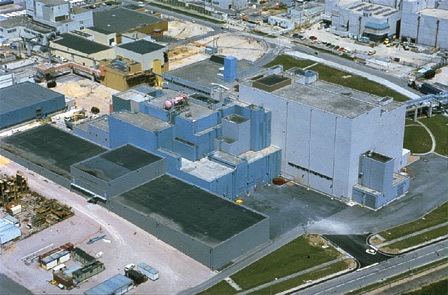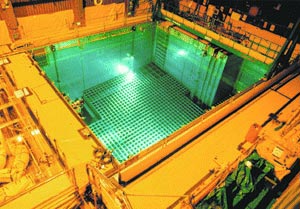Waste not, want not
The time has come for the U.S. to recycle its spent nuclear fuel
 Stubborn resistance to the reprocessing of spent nuclear fuel, driven by some long-held myths, has caused the United States to fall behind other countries as the rest of the world moves toward a "closed fuel cycle" by recycling its nuclear fuel.
Stubborn resistance to the reprocessing of spent nuclear fuel, driven by some long-held myths, has caused the United States to fall behind other countries as the rest of the world moves toward a "closed fuel cycle" by recycling its nuclear fuel.
More than 30 years of inactivity in this area has diminished our technological capability and intellectual capital to compete internationally. Not surprisingly, little funding has been available for radio-chemistry in our universities during that time, to a point where we now are all but irrelevant on the world stage.

Areva's reprocessing center in La Hague, France
France, Japan, the United Kingdom, Russia, India, and China all have invested substantially in programs to reprocess spent fuel. They have moved forward for two reasons: first, reprocessing recovers significant energy value from spent fuel that contributes to energy security. And, reprocessing substantially reduces the volume and radiotoxicity of high-level nuclear waste.
The once-through nuclear fuel cycle, which is our practice here in the United States, is an enormous waste of potential energy.
Part of the problem is one of perception: For decades, spent nuclear fuel has inaccurately been referred to as waste. But it is not waste. In fact, compared with other fuels used in the production of electricity, the energy density of uranium is remarkable-fully 95 percent of the energy value in a bundle of spent nuclear fuel rods remains available for re-use.
The true waste is in our failure to capitalize on this valuable and abundant domestic source of clean energy. That's something we can ill afford to do, particularly in a carbon constrained environment.

Spent fuel pool
Utilities operating nuclear power plants continue to store spent nuclear fuel rods on site in pools of water, as they have for more 30 years, before eventually moving them to dry cask storage. And while there is some debate over whether the casks should be located in one central storage site, the practice is widely accepted as safe and secure.
That's the first myth-that we don't know how to safely store nuclear spent fuel.
Critics of reprocessing also cite the potential for nuclear weapons proliferation as the biggest reason to oppose recycling. That, too, has acquired mythical status. The truth is that such concerns are largely unfounded.
While it is true that the plutonium in recycled nuclear fuel is fissionable, no country in the world has ever made a nuclear weapon out of low-grade plutonium from recycled high burn-up nuclear fuel. It just doesn't work for a strategic or a tactical nuclear weapon.
 If the United States is to get in the game and reverse decades of intransigence, it must establish an infrastructure for recycling nuclear fuel. The best way to do that, I believe, is by creating a public-private partnership that operates outside normal appropriations and has a charter to manage the fuel over a period of decades.
If the United States is to get in the game and reverse decades of intransigence, it must establish an infrastructure for recycling nuclear fuel. The best way to do that, I believe, is by creating a public-private partnership that operates outside normal appropriations and has a charter to manage the fuel over a period of decades.
The government's Blue Ribbon Commission, chartered by the Department of Energy, is charged with making recommendations for the safe, long-term management of spent fuel. The 15-member commission is to issue a draft report this summer, with a final report to be completed in January 2012.
Unless we act soon, within 10 years the United States will be the only major country in the world with nuclear power that lacks recycling capability. The time has come to get over our historic resistance to recycling nuclear fuel. After all, how can we tell other countries what they should or should not do with their nuclear waste when we refuse to take action ourselves?
_________________________________

Klein
Dale Klein, Ph.D., is associate vice chancellor for research at the University of Texas System and Associate Director of the Energy Institute at the University of Texas at Austin. He was a member of the Nuclear Regulatory Commission from 2006-2010 and served as its chairman from 2006-2009.
About the Energy Institute at the University of Texas at Austin:
The Energy Institute at the University of Texas at Austin initiates compelling research on some of the most pressing issues facing America today-issues vital to our nation's energy security and economic vitality. Through a multi-disciplinary, collaborative approach with academia, government, and private industry, the Energy Institute seeks practical solutions to real-world challenges-good policy based on good science.
For more on the Energy Institute, visit here.





